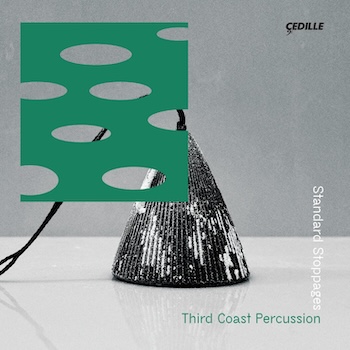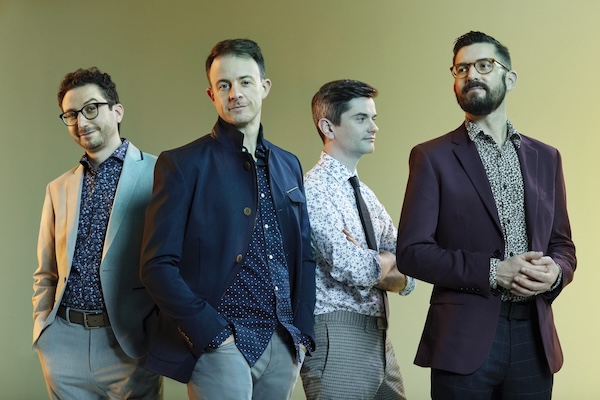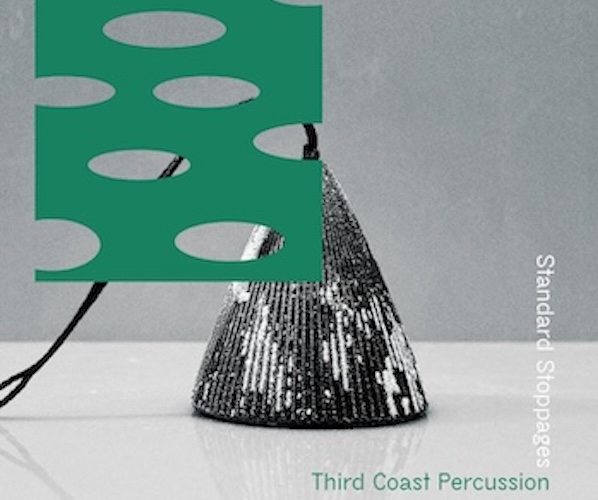By Jonathan Blumhofer
Stoppages is a veritable cornucopia of sounds experienced in multifarious combinations, showcasing a diversity of fresh, inventive, and satisfyingly expressive voices operating at full tilt.
 “Surprise,” the Russian novelist Boris Pasternak once noted, “is the greatest gift which life can grant us.” Though the observation predates the formation of the quartet Third Coast Percussion by several decades, the sentiment applies well enough to Standard Stoppages, the group’s new album celebrating their twentieth anniversary season.
“Surprise,” the Russian novelist Boris Pasternak once noted, “is the greatest gift which life can grant us.” Though the observation predates the formation of the quartet Third Coast Percussion by several decades, the sentiment applies well enough to Standard Stoppages, the group’s new album celebrating their twentieth anniversary season.
To be sure, the world of the percussion ensemble is an immensely varied one: pretty much anything that can be struck qualifies as an instrument. Accordingly, Stoppages is a veritable cornucopia of sounds experienced in multifarious combinations. Yet in works both big and small, its generous, nearly 80-minute-long program reveals a diversity of fresh, inventive, and satisfyingly expressive voices operating at full tilt. It is, if nothing else, one of the year’s most welcome, enjoyable musical surprises.
The disc’s single biggest item (by about thirty seconds) is Tigran Hamasyan’s Sonata for Percussion. Cast in three movements that run the gamut from shimmying asymmetrical meters to dreamy, delicate tone painting, it’s an effort that never quite goes in the directions one expects.
The outer pair are lilting and playful, marked by deceptively simple ideas that grow in complexity as the music proceeds. The first (“Memories from Childhood”) begins brightly and never lets up. Hamasyan’s subtle shading, how nimbly he clears out his materials, is continually absorbing. The finale is ecstatic, as much for its dazzling tone colors as for its rhythmic energy, textural variety, and expressive swagger. Meanwhile, the luminous central “Hymn” functions as a meditative breathing space.
Zakir Hussain’s Murmurs in Time boasts—at least over its first section—a ritualistic, devotional quality all its own. Drawing on Hindustani musical traditions, the score incorporates an extended chanting element that draws on vocalizations of drum sounds, culminating in a highly virtuosic, contrapuntal dialogue with actual drums and drones. The combination is so striking, in fact, that it somewhat overshadows the score’s purely instrumental second half, with its seamless transitions between notated and improvised episodes.
Fascinating plays of color and sonority also mark Jessie Montgomery’s Study No. 1. Primarily working with unpitched instruments, the music—though fitfully episodic—never sounds less than fascinating.

Third Coast Percussion. Photo: Saverio Truglia
Neither does the same composer’s In Color Suite, heard here in an arrangement by Sean Connors and TCP. These are expertly crafted miniatures: the atmospheric “Red,” droll “The Poet,” and lush “Purple” (the latter with haunting whistling emerging out of the ether). The three pieces fit so well with the percussion ensemble that it’s hard to imagine them in their original incarnation (for the non-typical combination of tuba and string quartet).
Transformations of a similar kind mark Jlin’s Please Be Still, a hypnotic, dance-like number that repurposes rhythmic figures from the “Kyrie” in Bach’s B-minor Mass. With its constantly fluctuating textures and themes held together by steady pulses and luminous colors, this is music that, by another name, might classify as an ode to joy.
And if Please Be Still somehow doesn’t fit that bill, Musekiwa Chingodza’s Dzoka Kumba certainly does. This is a euphoric, five-minute item that incorporates several instruments indigenous to Zimbabwe’s Shona people — it offers blissful, irresistible appeal.
As usual, Cedille’s engineering is natural and on-point, the ensemble and guests (Chingodza covers the vocals on Dzoka Kumba) all balanced with care. Additionally, the liner notes from Robert Dillon and David Skidmore are vivid and helpful. Strongly recommended.
Jonathan Blumhofer is a composer and violist who has been active in the greater Boston area since 2004. His music has received numerous awards and been performed by various ensembles, including the American Composers Orchestra, Kiev Philharmonic, Camerata Chicago, Xanthos Ensemble, and Juventas New Music Group. Since receiving his doctorate from Boston University in 2010, Jon has taught at Clark University, Worcester Polytechnic Institute, and online for the University of Phoenix, in addition to writing music criticism for the Worcester Telegram & Gazette.







